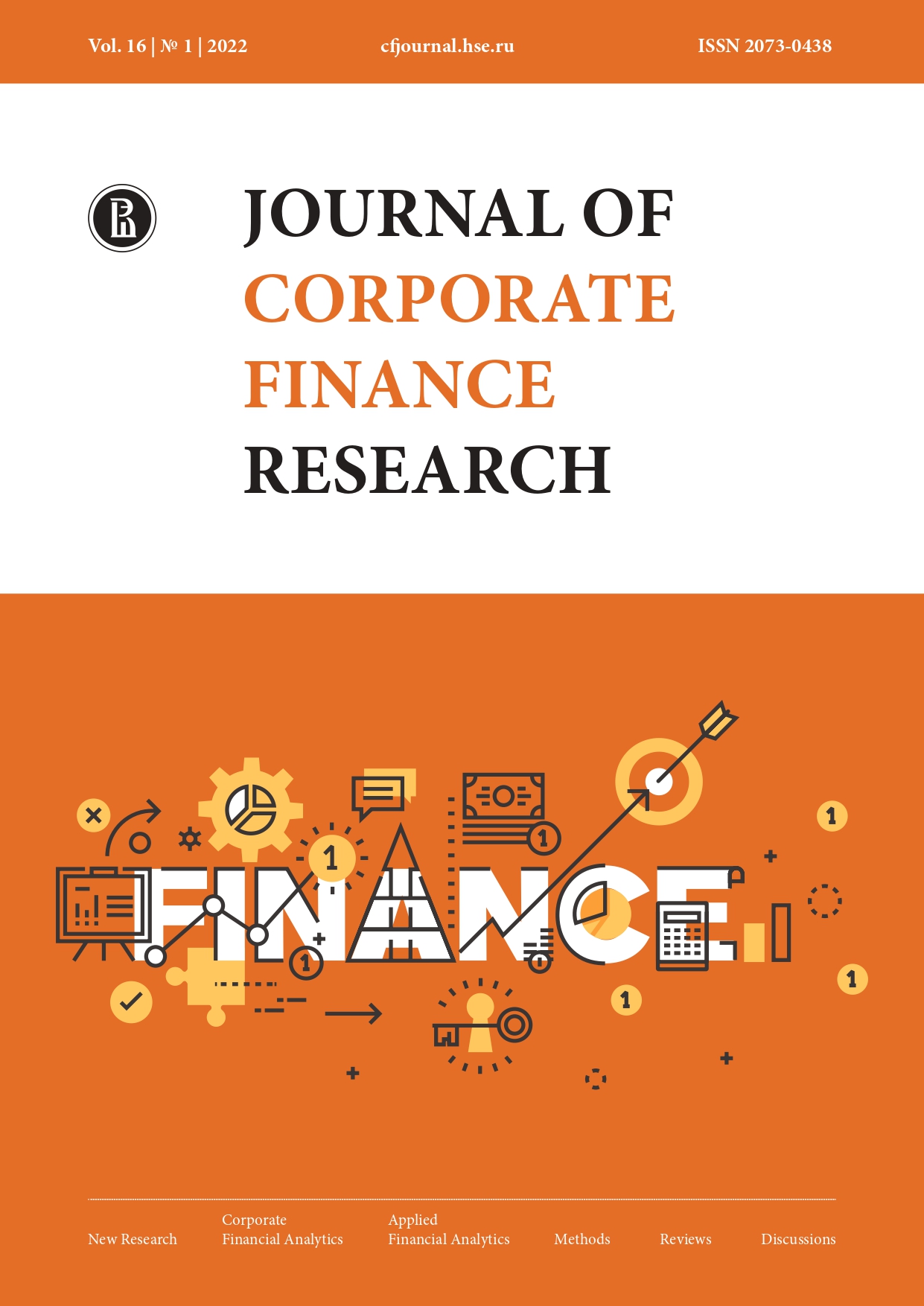Учет ESG-рисков в ставке дисконтирования при оценке бизнес
Аннотация
Цель исследования - разработка инструментов для определения и обоснования специфических ESG-рисков с целью их учета в ставке дисконтирования при оценке бизнеса с учетом прогнозируемых денежных потоков. Проведен анализ современных методов, стандартов и публикаций в данной области, в результате чего выявлена необходимость их доработки и развития для практического применения.В исследовании использованы труды отечественных и зарубежных авторов, а также собственный профессиональный опыт. Авторами применялись такие исследовательские методы, такие как классификация, логический и системный анализ, типология и обобщение.
Предложенные инструменты направлены на обоснование, дополнение и уточнение модели ставки дисконтирования (CAPM) путем введения дополнительных коэффициентов, учитывающих влияние ESG-факторов. В статье представлена шкальная модель оценки рисков в балльном выражении и инструменты их последующего перевода в корректирующие коэффициенты с использованием метода экспертных оценок, что уже сегодня позволяет применять их на практике. Модель учета специфических рисков основана на данных из литературных источников и продемонстрирована на практическом примере. Разработанный авторами инструмент предназначен для обеспечения аналитиков, оценщиков и экспертов качественным обоснованием и расчетом специфических рисков, связанных с ESG-факторами, при проведении оценки бизнеса. Также предполагается, что предложенные инструменты могут использоваться как один из критериев управления стоимостью бизнеса, позволяя разрабатывать меры по снижению специфических рисков и повышению капитализации компании.
Скачивания
Литература
Environmental, social, and governance (ESG) investing in the United States. Cerulli Associates. 2019. URL: https://info.cerulli.com/US-ESG-2019.html
Pastor L., Stambaugh R.F., Taylor L.A. Sustainable investing in equilibrium NBER Working Paper. 2020;(26549). URL: https://www.nber.org/system/files/working_papers/w26549/w26549.pdf DOI: https://doi.org/10.3386/w26549
Akhmetshina A., Kaspina R., Vagizova V., Ivanov S. Business model as a tool for increasing the market capitalization and reducing environmental impact of the company. Procedia Environmental Science, Engineering and Management. 2020,7(3):367-373. URL: http://www.procedia-esem.eu/pdf/issues/2020/no3/10_42_Akhmetshina_20.pdf
Khorin A., Krikunov A. ESG-risk factors and value multiplier of telecommunications companies. Journal of Corporate Finance Research. 2021;15(4):56-65. https://doi.org/10.17323/j.jcfr.2073- 0438.15.4.2021.56-65 DOI: https://doi.org/10.17323/j.jcfr.2073-0438.15.4.2021.56-65
Ashwin Kumar N.C., Smith C., Badis L., Wang N., Ambrosy P., Tavares R. ESG factors and risk-adjusted performance: A new quantitative model. Journal of Sustainable Finance & Investment. 2016;6(4):292-300. https://doi.org/10.1080/20430795.2016.1234909 DOI: https://doi.org/10.1080/20430795.2016.1234909
Cornell B. ESG preferences, risk and return. European Financial Management. 2021;27(1):12-19. https://doi.org/10.1111/eufm.12295 DOI: https://doi.org/10.1111/eufm.12295
Efimova O.V. Integrating sustainability issues into investment decision evaluation. Journal of Reviews on Global Economics. 2018;7:668-681. https://doi.org/10.6000/1929-7092.2018.07.61 DOI: https://doi.org/10.6000/1929-7092.2018.07.61
Feoktistova E.N., Alenicheva L.V., Dolgikh E.I., Kopylova G.A., Ozeryanskaya M.N., Khonyakova N.V. Analytical review of corporate non-financial reports: 2015-2016. Moscow: Russian Union of Industrialists and Entrepreneurs; 2017. 136 p. URL: https://rspp.ru/document/1/7/4/743222fc4c6650093518c635d0e8ecdd.pdf (In Russ.).
Zakhmatov D.Yu. The attitude of corporate business in the Russian Federation to the management of environmental, social risks, as well as corporate governance risks (ESG risks). Kazanskii ekonomicheskii vestnik = Kazan Economic Bulletin. 2021;(6):29-38. (In Russ.).
Feoktistova E.N., Alenicheva L.V., Kopylova G.A., Ozeryanskaya M.N., Purtova D.R., Khonyakova N.V. Analytical review of corporate non-financial reports: 2017-2018. Moscow: Russian Union of Industrialists and Entrepreneurs; 2019. 104 p. URL: https://рспп.рф/download/a48b14d9858856285b5f7aba0c57b076/ (In Russ.).
Berg F., Kölbel J.F., Rigobon R. Aggregate confusion: The divergence of ESG ratings. SSRN Electronic Journal. 2019. http://dx.doi.org/10.2139/ssrn.3438533 DOI: https://doi.org/10.2139/ssrn.3438533
A practical guide to sustainability reporting using GRI and SASB standards. Amsterdam: Global Reporting Initiative; 2021. 42 p. URL https://www.globalreporting.org/media/mlkjpn1i/gri-sasb-joint-publication-april-2021.pdf
Verles M., Vellacott T. Business and the sustainable development goals: Best practices to seize opportunity and maximise credibility. Geneva: Gold Standard; 2018. 19 p. URL: https://www.goldstandard.org/sites/default/files/documents/sdg_report_optimized.pdf
Cornell B., Damodaran A. Valuing ESG: Doing good or sounding good? SSRN Electronic Journal. 2020. http://dx.doi.org/10.2139/ssrn.3557432 DOI: https://doi.org/10.2139/ssrn.3557432
Perspectives paper: ESG and business valuation. IVSC. Mar. 02, 2021. URL: https://www.ivsc.org/perspectives-paper-esg-and-business-valuation/
Perspectives paper: A framework to assess ESG value creation. IVSC. May 26, 2021 URL: https://www.ivsc.org/a-framework-to-assess-esg-value-creation/
Perspectives paper: ESG and real estate valuation. IVSC. Oct. 14, 2021 URL: https://www.ivsc.org/esg-and-real-estate-valuation/
Aronsohn A. Survey: ESG & valuation. IVSC. Feb. 14, 2022. URL: https://www.ivsc.org/esg-survey/
European valuation standards (EVS). TEGOVA. 2021. URL: https://tegova.org/european-valuation-standards-evs
RICS valuation – global standards. London: RICS; 2021. 296 p. URL: https://www.rics.org/globalassets/rics-website/media/upholding-professional-standards/sector-standards/valuation/2021-11-25_rics-valuation--global-standards-effective-2022.pdf
Ilhan E., Sautner Z., Vilkov G. Carbon tail risk. The Review of Financial Studies. 2021;34(3):1540-1571. https://doi.org/10.1093/rfs/hhaa071 DOI: https://doi.org/10.1093/rfs/hhaa071
Trugman G.R. Understanding business valuation: A practical guide to valuing small to medium sized businesses. 3rd ed. New York: American Institute of Certified Public Accountants; 2008. 943 p.
Mercer Z.C. The adjusted capital asset pricing model for developing capitalization rates: An extension of previous “build-up” methodologies based upon the capital asset pricing model. Business Valuation Review. 1989;8(4):147-156. https://doi.org/10.5791/0882-2875-8.4.147 DOI: https://doi.org/10.5791/0882-2875-8.4.147
Mercer Z.C., Harms T.W. Business valuation: An integrated theory. Hoboken, NJ: John Wiley & Sons, Inc.; 2008. 288 p.
Practical guide to valuating RUSNANO assets. Moscow: ROSNANO; 2010. 132 p. URL: https://www.ocenchik.ru/site/met/rosnano1.pdf (In Russ.).
Methodology and guidelines for conducting business and/or assets valuation of RAO “UES of Russia” and SDCs of RAO “UES of Russia”. Deloitte & Touche. 2007. URL: https://www.ocenchik.ru/method/business/260/ (In Russ.).
Dellham D., Mueller H. A new vision of value: Connecting corporate and societal value creation. Amstelveen: KPMG; 2014. 116 p. URL: https://home.kpmg/content/dam/kpmg/pdf/2014/11/A-New-Vision-of-Value.pdf
The true price of jeans. Amsterdam: Impact Institute; 2019. 30 p. URL: https://trueprice.org/wp-content/uploads/2019/06/Impact-Institute-Report-True-Price-of-Jeans.pdf
Copyright (c) 2022 Национальный исследовательский университет «Высшая школа экономики»

Это произведение доступно по лицензии Creative Commons «Attribution-NonCommercial-NoDerivatives» («Атрибуция — Некоммерческое использование — Без производных произведений») 4.0 Всемирная.

